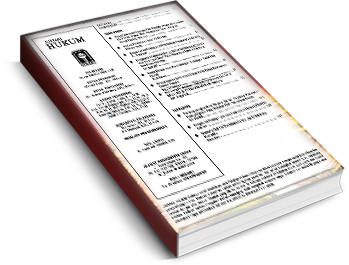Main Article Content
Abstract
Basedon the changes to the 1945constitution, iegisiative poweris in hands of the Houseof Representatives notin the handsof Legislative Assembiy or District Representatives. In practice, almost ailpresidential powers canbesubject tointerference from theHouse of Representatives themostdangerous power possessedbytheHouse ofRepresentatives
is that in making legislation the president does not possess the right of veto. Such construction can create an imbalance of powerbetween the legislative and the executive. Therefore, a semipresidential model applied bythe French can be used as an alternative modelfor the Indonesian goverment.
is that in making legislation the president does not possess the right of veto. Such construction can create an imbalance of powerbetween the legislative and the executive. Therefore, a semipresidential model applied bythe French can be used as an alternative modelfor the Indonesian goverment.
Article Details
License
Authors who publish with this journal agree to the following terms:
a. Authors retain copyright and grant the journal right of first publication with the work simultaneously licensed under a Creative Commons Attribution License that allows others to share the work with an acknowledgement of the work's authorship and initial publication in this journal.
b. Authors are able to enter into separate, additional contractual arrangements for the non-exclusive distribution of the journal's published version of the work (e.g., post it to an institutional repository or publish it in a book), with an acknowledgement of its initial publication in this journal.
How to Cite
Nasution, A. B. (2016). Relasi Kekuasaan Legislatif dan Presiden Pasca Amandemen UUD 1945: Sistem Semi Presidensial dalam Proyeksi. Jurnal Hukum IUS QUIA IUSTUM, 12(28), 1–11. https://doi.org/10.20885/iustum.vol12.iss28.art1




